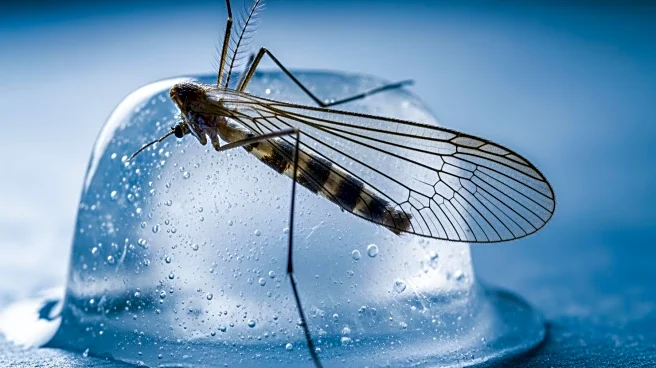What's Happening?
For the first time, mosquitoes have been discovered in Iceland, a country previously known for its mosquito-free environment due to its cold climate. This discovery was made by insect enthusiast Bjorn
Hjaltason, who found the mosquitoes in Kjós, a glacial valley near Reykjavik, after the country experienced unprecedented heat this spring. The mosquitoes were identified as Culiseta annulata, a species capable of surviving winter conditions. Iceland's recent heatwave, which saw temperatures exceed 20°C for ten consecutive days and reach a record high of 26.6°C, is believed to have contributed to this development. The Icelandic Institute of Natural History confirmed the identification of the mosquitoes, raising questions about the potential establishment of this species in Iceland.
Why It's Important?
The presence of mosquitoes in Iceland is significant as it highlights the broader impacts of climate change on ecosystems previously unaffected by such species. The introduction of mosquitoes could disrupt local ecosystems and pose new public health challenges, as these insects are known carriers of various diseases. The situation underscores the vulnerability of cold-climate regions to rising global temperatures, which can lead to shifts in biodiversity and the introduction of non-native species. This development serves as a reminder of the far-reaching consequences of climate change, emphasizing the need for global efforts to mitigate its effects.
What's Next?
Further monitoring is planned to determine if the mosquito species will establish a permanent presence in Iceland. This will involve observing the insects' behavior and population dynamics in the coming spring. The potential establishment of mosquitoes in Iceland could prompt public health and environmental agencies to develop strategies to manage and mitigate the impact of these insects. Additionally, the situation may lead to increased scrutiny of shipping and transportation routes that could facilitate the introduction of non-native species.
Beyond the Headlines
The discovery of mosquitoes in Iceland raises ethical and environmental questions about human responsibility in climate change and its impact on global biodiversity. It highlights the need for international cooperation in addressing climate-related challenges and protecting vulnerable ecosystems. The situation also prompts a reevaluation of conservation strategies in cold-climate regions, which may need to adapt to new environmental realities.










